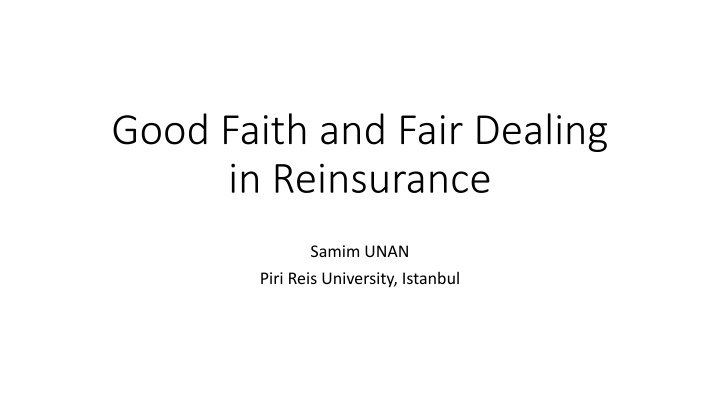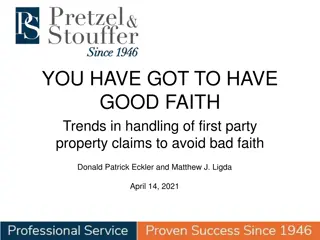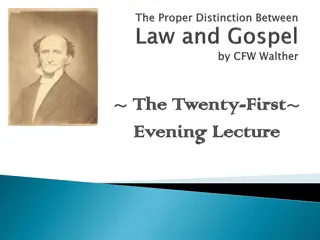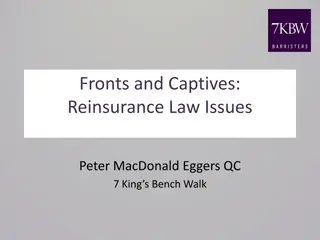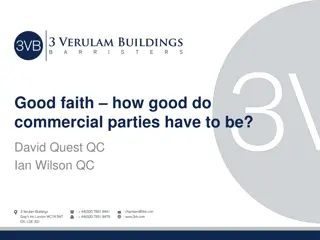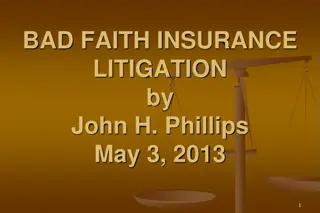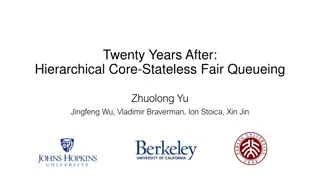Good Faith and Fair Dealing in Reinsurance
the principles of good faith and fair dealing in reinsurance at national and international levels, with a focus on Switzerland, Germany, and France. This includes legal provisions emphasizing the importance of acting in good faith in legal relationships and contractual obligations.
Download Presentation

Please find below an Image/Link to download the presentation.
The content on the website is provided AS IS for your information and personal use only. It may not be sold, licensed, or shared on other websites without obtaining consent from the author.If you encounter any issues during the download, it is possible that the publisher has removed the file from their server.
You are allowed to download the files provided on this website for personal or commercial use, subject to the condition that they are used lawfully. All files are the property of their respective owners.
The content on the website is provided AS IS for your information and personal use only. It may not be sold, licensed, or shared on other websites without obtaining consent from the author.
E N D
Presentation Transcript
Good Faith and Fair Dealing in Reinsurance Samim UNAN Piri Reis University, Istanbul
Content of the presentation Good faith and fair dealing as a general and fundamental principle At national level At international level Good faith and fair dealing in the PRICL
Good faith and fair dealing principle National level- Switzerland Swiss Constitution Art. 5 Rule of law 1All activities of the state are based on and limited by law. 2State activities must be conducted in the public interest and be proportionate to the ends sought. 3State institutions and private persons shall act in good faith. 4The Confederation and the Cantons shall respect international law.
Good faith and fair dealing principle National level Switzerland Swiss Civil Code Art. 2 B. Scope and limits of legal relationships I. Acting in good faith Art. 2 1Every person must act in good faith in the exercise of his or her rights and in the performance of his or her obligations. 2The manifest abuse of a right is not protected by law.
Good faith and fair dealing principle National level- Switzerland Swiss Civil Code Art. 3 II. Good faith Art. 3 1Where the law makes a legal effect conditional on the good faith of a person, there shall be a presumption of good faith. 2No person may invoke the presumption of good faith if he or she has failed exercise the diligence required by the circumstances.
Good faith and fair dealing principle National level- Germany BGB 242 (Performance in good faith) An obligor has a duty to perform according to the requirements of good faith, taking customary practice into consideration.
Good faith and fair dealing principle National level-France France: Ordonnance no 2016-131 du 10 f vrier 2016 portant r forme du droit des contrats, du r gime g n ral et de la preuve des obligations. Les contrats doivent tre n goci s, form s et ex cut s de bonne foi. Cette disposition est d'ordre public. . (Contracts must be negotiated, concluded and performed in good faith. This is public order provision) L'article 2274 du Code civil La bonne foi est toujours pr sum e, et c'est celui qui all gue la mauvaise foi la prouver. (presumption of good faith).
Good faith and fair dealing principle- National level-France France Negotiations (Art. 1112 French Civil Code): Initiation, conduct and rupture of precontractual negotiations are free but they must mandatorily conform the requirements of good faith . Freedom to negotiate and freedom to contract is the rule. But there is a limit: good faith.
Good faith and fair dealing principle National level-France Definition Good faith is the belief to be conforming with rules, and the conscience of acting without making harm to the rights of others. (https://www.dictionnaire-juridique.com/definition/bonne-foi.php -
Good faith and fair dealing principle National level-France Fran ois Campagnola (Bonne foi et loyaut en droit des contrats (https://www.village-justice.com/articles/Bonne-foi-loyaute-droit- des-contrats,23007.html): A notion used frequently in order to minimize the harshness of the legal rules (especially when the application of the statutory rules leads to unequitable results for one of the parties).
Good faith and fair dealing principle National level-France The good faith and fair dealing principle is not an obligation. It is not exhausted by performance. General requirement which is destined to shape the contractual relationship in its integrity. The parties to the contract may not derogate from it. It is imposed to each and every party to the contract without having regard to its quality of trader or professional or consumer.
Good faith and fair dealing principle National level-France Abuse of rights Venire contra factum proprium To try to take advantage of a situation acquired unlawfully. To invoke the form defect after having induced the other party that this defense will not be used. To invoke time bar after having stalled the other party so that the other party has remained inactive until the end of the prescription period.
Good faith and fair dealing principle National level-France Voluntary non-performance of the contractual obligation may constitute a violation of the good faith and fair dealing principle (for example obligor creating a situation which prevents the performance obligor organizing his own insolvency). Obligor acting with bad faith may lose his right to limit his liability or to invoke an exoneration clause. Duty to inform: General rule for contracts. Not only at the precontractual stage but also later during performance of the obligations.
Good faith and fair dealing principle National level-France Interpretation of contracts: The common intention of the parties is relevant rather than the literal application of the contractual provisions. The obligor did not pay the sum of 1 (one) FF expressly stipulated. The other party terminated the contract pursuant to a contractual clause. Held that this was an abuse of right having regard to the aim of the contract (Cour de cassation, Chambre civile 3, 6 Juin 1984 no.83-10946: long term lease contract; annual fee only one French Franc). (Termination of the contract on the ground of non-payment of the sale price in due time despite the fact that the buyer offered to pay ten minutes after the deadline, will be regarded contrary to the good faith principle in French law).
Good faith and fair dealing principle National level-France Negotiations conducted in bad faith: A person who starts the negotiations or continues to negotiate without having the intention to reach a deal, or A person who continues to negotiate only for dissuading the other to finalize a deal with a third person A person who continues to negotiate with the aim of obtaining confidential information Sudden rupture of the negotiations or very late cessation of the negotiations may constitute violations of the good faith principle.
Good faith and fair dealing principle National level-France Protection of the equilibrium between the contracting parties: Obligation to renegotiate in case of subsequent (unforeseeable) alteration of the circumstances (variation of the contract). However, if changing circumstances were not excessively burdensome for one of the parties but excessively beneficial for the other, the principle of good faith cannot be relied upon for claiming a part of the profit. Today certain countries have in their laws clear provisions imposing on the parties the obligation to renegotiate to remedy the unforeseen developments. Thus no need anymore to resort to good faith .
Good faith and fair dealing principle National level-France Exercise of the right to terminate: If the default of the other party is minor (marginal), violation of the good faith principle .
Good faith and fair dealing National level- Summary The principle of good faith and fair dealing is a fundamental principle of law (public as well as private) in a number of civil law countries Very large scope of application Many legal institutions have their roots in the good faith and fair dealing principle (such as information duties, abusive clauses)
Good faith and fair dealing principle International level Translex Principles Translex Principles The TransLex-Principles are a systematic online-collection of principles and rules of transnational commercial law. They are being used by counsel and arbitrators in international arbitrations as well as contract drafters, academics and participants of moot court competitions in international arbitration across the globe. No. I.1.1 - Good faith and fair dealing in international trade (a) Parties to international business transactions must act in accordance with good faith and fair dealing in international trade. This standard applies to the negotiation, formation, performance and interpretation of international contracts. (b) . (c) The parties may not exclude or limit the application of this principle to their legal relationship.
Good faith and fair dealing principle International level Translex Principles Translex Principles No. I.1.2 - Prohibition of inconsistent behavior (a) A party cannot set itself in contradiction to its previous conduct vis- -vis another party if that latter party has acted in reasonable reliance on such conduct ("venire contra factum proprium"; "l'interdiction de se contredire au d triment d'autrui"). (b) Violation of this principle may result in the loss, suspension, or modification of rights otherwise available to the party violating this Principle or in the creation of rights otherwise not available to the aggrieved party.
Good faith and fair dealing principle International level UNIDROIT PICC UNIDROIT PICC (Principles of International Commercial Contracts) ARTICLE 1.7 (Good faith and fair dealing) Each party must act in accordance with good faith and fair dealing in international trade. The parties may not exclude or limit this duty.
Good faith and fair dealing principle International level- PECL PECL (Principles of European Contract Law) Section 2 - General Obligations Article 1:201 (ex art. 1.106) - Good Faith and Fair Dealing (1) Each party must act in accordance with good faith and fair dealing. (2) The parties may not exclude or limit this duty.
Good faith and fair dealing principle International level- PEICL PEICL (Principles of European Insurance Contract Law) Article 1:104 Interpretation The PEICL shall be interpreted in the light of their text, context, purpose and comparative background. In particular, regard should be had to the need to promote good faith and fair dealing in the insurance sector, certainty in contractual relationships, uniformity of application and the adequate protection of policyholders.
Good faith and fair dealing principle International level - PEICL PEICL Article 2:304 Abusive Clauses (1) A term which has not been individually negotiated shall not be binding on the policyholder, the insured or the beneficiary if, contrary to the requirements of good faith and fair dealing, it causes a significant imbalance in his rights and obligations arising under the contract to his detriment, taking into account the nature of the insurance contract, all the other terms of the contract and the circumstances at the time the contract was concluded. (This Article is modelled on Directive 93/13/EEC).
PRICL (Principles of reinsurance contract law) Article 1.1.6 (Interpretation and internal gaps) In the interpretation of the PRICL, regard is to be had to their international character and to their purposes including the need to promote the observance of good faith and fair dealing in the reinsurance sector and uniformity in the application of the PRICL. Issues within the scope of the PRICL but not expressly settled by them are insofar as possible to be settled in accordance with their underlying principles
PRICL (Principles of reinsurance contract law) Interpretation: PRICL aim at setting out criteria of interpretation which meet the needs of reinsurance. This is why reference is made to the promotion of good faith and fair dealing in the reinsurance sector
PRICL (Principles of reinsurance contract law) ARTICLE 2.1.2 (Duty of utmost good faith) The parties owe one another the duty of utmost good faith. Utmost Good Faith means honesty and transparency as well as fairly taking into account the interests of the other party. The duty to observe utmost good faith constitutes the basis for formulating the individual duties (Heiss, PRICL, Introduction, p.5). Parties will not be allowed to exclude the application of this duty (They may modify particular aspects of it where appropriate for example they may modify a particular duty resulting from the application of utmost good faith) The duty to observe utmost good faith is a basic principle of law and should be considered mandatory (Heiss, PRICL Art.1.1.3, C.2). Applicable at all stages: Precontractual, entire performance (throughout the life of the contract).
PRICL (Principles of reinsurance contract law) Utmost good faith: The term utmost is used to avoid any suggestion that the PRICL limit the duties of the parties compared to the existing reinsurance contract law Otherwise the expression utmost good faith well established in the English speaking jurisdictions does not differ from the good faith concept of other jurisdictions. (Stempel, PRICL Art.2.1.2, C6). Why the duty of utmost good faith is imposed? Reinsurers depend on receiving adequate disclosure of material information from ceding insurers. Result: imposition of rigorous duties of disclosure. Reinsurers rely on risk evaluation and handling of claims by ceding companies and trust their contract partners (and reduce precontractual costs and monitoring costs) (Stempel, PRICL, Art.2.1.2, C.6)
PRICL (Principles of reinsurance contract law) PRICL Illustration no.11: Reinsurance of the product liability insurance of a pharmaceutical company. The policyholder (drug company) has disclosed to the ceding company that there are 200 adverse reactions from the consumers and the health authority has started an investigation. The ceding company does not share this information with the reinsurers. The reinsurers don t inquire as to whether the ceding company has knowledge of any problems with the drugs. The ceding company did not make any false representations. However the ceding company has violated the duty of utmost good faith (as it failed to disclose information a reasonable reinsurer would want to know)
PRICL (Principles of reinsurance contract law) The touchstone of the concept of utmost good faith: honest and reasonable conduct (in the context of the situation). Golden rule: Each party treats the other as it would want to be treated. Where a ceding company doesn t disclose an information it would expect to be disclosed if it were reinsurer, it is in violation of the duty of (utmost) good faith. Where a reinsurer argues that a claim is overpaid based on its own interpretation in a case open to discussion, it breaches the duty of (utmost) good faith. (it should not have failed to give the ceding company the reasonable benefit of the doubt).
PRICL (Principles of reinsurance contract law) The duty of utmost good faith is reciprocal A reinsurer which suffers substantial losses with investments so that those losses pose an important threat as to its solvability (and this information is not available from public sources), it is under the duty to inform the ceding companies. (PRICL, Illustration no.14).
PRICL (Principles of reinsurance contract law) The duty of utmost good faith during the contract period: No need to continuously update the reinsurer about the items that had been disclosed at the pre-contractual stage (debatable) No breach of the duty of utmost good faith if the ceiling provided for non- economic damages or pain and suffering had been increased from US$ 250.000 to US$ 1.000.000 and this was not disclosed to the reinsurers (PRICL, Illustration no.15) Same for overruling of the supreme court decision according to which the reckless driver should not be compelled to pay punitive damages (PRICL, Illustration no.16) But when the reinsurance is to be renewed, the situation changes.
PRICL (Principles of reinsurance contract law) Consent provisions: Good faith would require that the ceding company abides by provisions stating that cedent companies settlements are allowed only if the reinsurer gives its (prior) consent. If the reinsurer unreasonably withholds its consent, this would constitute also a violation of the (utmost) good faith duty. The burden of proof is on the party that alleges the breach of the utmost good faith duty.
PRICL (Principles of reinsurance contract law) Article 2.1.4 (Confidentiality). A result of the good faith principle. Parties should take adequate care to avoid unauthorized disclosure of information to third parties. Article 2.1.4 (Dispute resolution) The parties shall make reasonable and diligent efforts to resolve disputes arising pursuant to the contract as expeditiously and efficiently as possible. The duty of utmost good faith requires that disputing parties refrain from opportunistic behavior (conduct that deprives another party of the benefit of bargain by making it unduly difficult to resolve disputes quickly and cost effectively).
PRICL (Principles of reinsurance contract law) The duty of utmost good faith plays a role (also) in the application of the following provisions Article 2.2.1 (Duty of disclosure) Article 2.3.1 (Premium payment) Article 2.3.2 (Contract documentation) Article 2.3.3 (Reinsurer s rights of inspection) Article 2.4.1 (Notice of claims) Article 2.4.2 (Claims handling by the reinsured) Article 2.4.4 (Timely payment of reinsurance claims) Article 3.1 (Remedies for breach of contract) Article 3.2 (Remedies for breach of precontractual duty of disclosure)
PRICL (Principles of reinsurance contract law) PRICL refers to the principle of utmost good faith quasi with regards of each and every issue. In many instances, instead of stating particular rules (subsections) providing fact + legal consequence, PRICL have preferred a limited number of general rules. The scope of application of those general rules would be shaped in accordance with the paramount principle of good faith.
